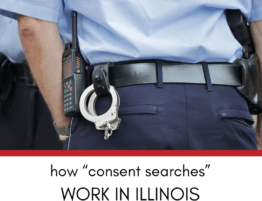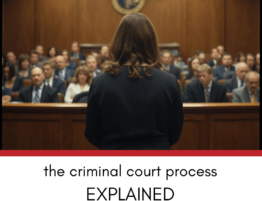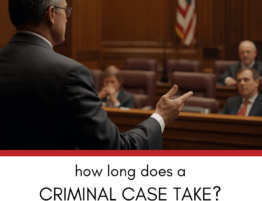
Deciding to plead guilty in a criminal case is a significant step with important consequences. Understanding what happens after you plead guilty can help you navigate the process and prepare for what lies ahead.
What Happens After You Plead Guilty?
Pleading guilty in a criminal case involves admitting to the crime and accepting the associated penalties. This guide explains the following:
- The sentencing process
- Pre-sentence investigations
- The sentencing hearing
- Potential outcomes and penalties
- Frequently asked questions
Here’s a closer look at each.
The Sentencing Process
After you plead guilty, the court will move forward with the sentencing process. The judge will schedule a sentencing hearing, where they will determine the appropriate penalties based on the nature of the crime, your criminal history, and other relevant factors. The judge will consider various elements, including the seriousness of the offense, any mitigating circumstances, and any plea agreements made between your lawyer and the prosecution.
Related: Criminal defense information
Pre-Sentence Investigations
Before the sentencing hearing, a probation officer will likely conduct a pre-sentence investigation. This investigation involves a thorough review of your background, including your criminal history, personal circumstances, and any factors that might affect the sentencing decision. The probation officer will gather information from various sources, including interviews with you, your family, and others who can provide insight into your character and behavior.
The probation officer will prepare a pre-sentence report, which is a comprehensive document summarizing the findings of the investigation. This report will include recommendations for sentencing based on the information gathered. The judge will use this report to help determine an appropriate sentence.
The Sentencing Hearing
The sentencing hearing is a critical step in the process after you plead guilty. During this hearing, the judge will review the pre-sentence report and consider any additional arguments from both the prosecution and defense. You and your lawyer will have the opportunity to present mitigating factors that could lead to a lighter sentence. Mitigating factors might include your lack of a prior criminal record, your cooperation with law enforcement, or evidence of rehabilitation efforts.
The prosecution may present aggravating factors to argue for a harsher sentence. Aggravating factors could include the severity of the crime, any harm caused to victims, or any prior criminal behavior. The judge will weigh these factors and determine an appropriate sentence based on the evidence and arguments presented.
Related: Can a lawyer help you if you violate the conditions of your bond?
Potential Outcomes and Penalties
The sentence you receive after pleading guilty will depend on various factors, including the nature of the crime and your criminal history. Potential outcomes and penalties can include:
- Incarceration: You may be sentenced to serve time in jail or prison. The length of the sentence will depend on the severity of the crime and any mitigating or aggravating factors.
- Probation: Instead of serving time in jail, you may be placed on probation. Probation involves regular check-ins with a probation officer and adherence to certain conditions, such as avoiding further criminal activity and participating in rehabilitation programs.
- Fines: You may be required to pay fines as part of your sentence. The amount of the fine will depend on the nature of the crime and any applicable state laws.
- Community Service: You may be ordered to complete a certain number of hours of community service as part of your sentence. This involves performing unpaid work for the benefit of the community.
- Rehabilitation Programs: Depending on the nature of the crime, you may be required to participate in rehabilitation programs, such as drug or alcohol treatment, anger management classes, or counseling.
Your lawyer will help you understand the potential outcomes and work to secure the best possible result for your case.
FAQ About Pleading Guilty
Check out these commonly asked questions about what happens after you plead guilty. If you don’t see your question here, please call our office and we’ll find you the answers you need.
Can I Change My Plea After Pleading Guilty?
In some cases, it may be possible to change your plea after pleading guilty, but this is generally difficult and depends on the specifics of your case and court rules. You would need to file a motion to withdraw your guilty plea, and the court would decide whether to grant it based on the circumstances. Consult your lawyer to explore your options.
Related: How the appeal process works in Illinois
Will I Have a Criminal Record After Pleading Guilty?
Yes, pleading guilty results in a conviction on your criminal record. This record can affect various aspects of your life, including employment opportunities, housing options, and more. Depending on the nature of the offense and other factors, you may be able to seek expungement or sealing of your record in the future. Your lawyer can provide guidance on these options.
What Should I Expect at the Sentencing Hearing?
At the sentencing hearing, the judge will review the pre-sentence report, listen to arguments from both the prosecution and defense, and consider any mitigating or aggravating factors. You and your lawyer will have the opportunity to present information that could lead to a lighter sentence. The judge will then impose a sentence based on the evidence and arguments presented.
Can I Appeal the Sentence After Pleading Guilty?
In some cases, you may be able to appeal the sentence if you believe there were legal errors in the sentencing process. However, the ability to appeal is generally limited when you have pleaded guilty. Your lawyer can help you understand whether you have grounds for an appeal and guide you through the process if applicable.
How Can a Lawyer Help After Pleading Guilty?
A lawyer can provide crucial support after you plead guilty by representing you at the sentencing hearing, presenting mitigating factors, and advocating for a fair sentence. They can also help you understand your rights and options, including the possibility of appealing the sentence or seeking expungement in the future.
Do You Need to Talk to an Attorney?
If you’ve been accused of a crime, we may be able to help you – and don’t worry: It’s completely confidential. Call us at 847-920-4540 or fill out the form below to schedule your free, private consultation with an experienced and skilled Chicago criminal defense attorney now.
Contact Us
"*" indicates required fields









